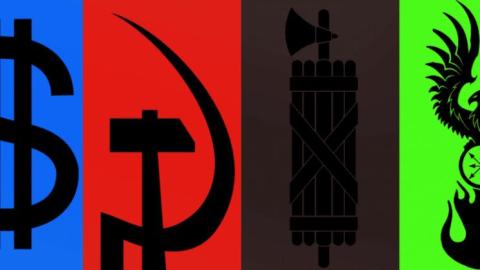A LIBERAL NIGHTMARE: THE RISE OF THE FOURTH POLITICAL THEORY Primary tabs
Primary tabs

Under the apocalyptic postmodern condition, every thinking being is obsessed/ preoccupied with one existential question: What comes after liberal capitalism? The failure of liberal world order and the rise of capitalist centric disruptive technological technologies are posing a huge threat to the existential horizons of human societies. On the face of postmodern confusion, there is a great appeal from the ordinary masses for more coherent and genuine political alternative to replace liberalism. Nonetheless, the rise of disruptive technologies jeopardizes the very existence of human being (sein) in every sphere. Moreover, the fact cannot be denied that the rapid development in technology will closely integrate the world across all spheres.
Consequently, at the same time the disruptive technologies will pose a huge menace to human existential horizons. For instance, the growing capitalist surveillance will shatter liberal cherished civil liberties and the growing control over individual is a worst case scenario. In this respect, one of the popular commencement of new intellectual discourse was initiated by famous Russian philosopher Alexander Dugin through his politico-theological treatise “The Fourth Political Theory and The Rise of Fourth Political Theory”.
Basically, the ontological basis of Dugin’s political treatise can be traced in the degeneration of three popular political ideologies of modernity i:e liberalism, communism and fascism. The philosophical essence of Dugin’s Fourth Political Theory can only be understood by navigating his thinking between Husserlian phenomenology and Heideggerian philosophy. For Dugin, it was Heideggerian philosophy in which he found the possibility of new beginning. Hence, according to Dugin, a new political theory as an alternative is needed to replace liberalism.
The continuous chaos, conflicts, relentless wars and the crisis of democracy indicates the beginning of an end. In addition, the existing liberal elites, which are benefiting from the existing global status quo justifying the failures by associating it with the irresponsibility. From the last 5 years, I have been actively watching and listening to liberal commentators at the World Economic Forum conferences in Davos. All of them reiterate and recommend that there is a need ethical behavior and responsibility to manage the crisis of liberal democracy and capitalism. Similarly, since 2018 one of the major themes of conferences at World Economic Forum in Davos was surrounding single bare question: is ethical capitalism possible?—which sounds dystopian indeed.
Very recently, famous American political scientist John J. Mearsheimer in his new book “The Great Delusion: Liberal Dreams and International Realties” expressed his concerns about the liberal disorder. In chapter six of the book titled “Liberalism as a source of trouble” begins with these aggrieved words: “The cost of Liberal hegemony begin with the endless wars, a liberal state ends up fighting to protect human rights and spread liberal democracy around the world. Once unleashed on the world stage, a liberal unipole soon becomes addicted to war”.
The latter scornful manifestation seems a genuine eulogy and a concrete disenchantment with the liberal world order. In sharp contrast, with the latter illustration John J. Mearsheimer has expressed his rational view concerning the failure and crisis of liberal democracy and liberal world order in general. Moreover, Mearsheimer as a pioneer of famous theory of IR offensive realism understands the multidimensional geopolitical consequences of liberal disorder.
As a matter of fact, Dugin’s Fourth Political Theory as a new political alternative opposes the geopolitical and ideological victory of liberalism over communism and fascism. For Dugin, liberalism as a foundational basis of Capitalism reached its peak during the cold war and hence, began disintegrating in the post-cold war era, when it became unchallenged. In this way, the unchallenged post-liberalism came into close association with postmodernity. Unfortunately, today it is the postmodernity that defines post-liberalism—, which illustrates the complete relegation and refutation of liberal history.
In Dugin’s opinion, the victory of liberalism with the fall of Soviet communism was actually the end of liberalism as an ideology—what he calls in his book ‘a paradox’. Although for Dugin, since its inception, philosophically liberalism was less dogmatic as compared to communism but in the later stages, it grew stronger as typical subject with different viewpoints or set of ideas. Similarly, Individualism as a major subject of liberal political philosophy persisted normative in nature during the developmental stages. Perhaps, this is how individualism as normative subject of liberalism entered into the post-industrial phase and embraced the post-modern condition due to alienation from ‘choices’.
Notwithstanding, the liberal postmodernity clearly stipulates the inherent contradictions within modernity and the ideologies it has cherished and nurtured. In this regard, the major purpose of Alexander Dugin’s Fourth Political Theory is to understand postmodern human condition and propose a coherent and comprehensive theoretical solution to replace liberalism. In this regard, the rise of The Fourth Political Theory as new ideological and philosophical alternative at the global stage is indeed a liberal nightmare.
